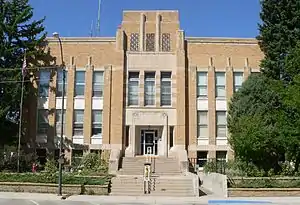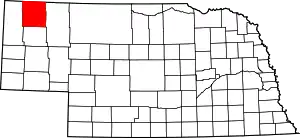Dawes County, Nebraska
Dawes County is a county in the U.S. state of Nebraska. As of the 2010 United States Census, the population was 9,182.[1] Its county seat is Chadron.[2] The county was formed in 1885; it was named for James W. Dawes, the Nebraska Governor at the time.[3]
Dawes County | |
|---|---|
 Dawes County Courthouse in Chadron | |
 Location within the U.S. state of Nebraska | |
 Nebraska's location within the U.S. | |
| Coordinates: 42°43′N 103°08′W | |
| Country | |
| State | |
| Founded | 19 February 1885 |
| Named for | James W. Dawes |
| Seat | Chadron |
| Largest city | Chadron |
| Area | |
| • Total | 1,401 sq mi (3,630 km2) |
| • Land | 1,396 sq mi (3,620 km2) |
| • Water | 4.6 sq mi (12 km2) 0.3%% |
| Population | |
| • Estimate (2018) | 8,716 |
| • Density | 6.4/sq mi (2.5/km2) |
| Time zone | UTC−7 (Mountain) |
| • Summer (DST) | UTC−6 (MDT) |
| Congressional district | 3rd |
| Website | [<span%20class="url"> |
In the Nebraska license-plate system, Dawes County is represented by the prefix 69 (it had the 69th-largest number of vehicles registered when the license-plate system was established in 1922).
History
Dawes County was a part of the unorganized area of northwestern Nebraska until February 19, 1877 when it became a part of Sioux County from which it was separated February 19, 1885 and was given its present name.[4]
Geography
Dawes County lies on the north border of Nebraska. Its north boundary line abuts the south boundary line of the state of South Dakota. According to the US Census Bureau, the county has an area of 1,401 square miles (3,630 km2), of which 1,396 square miles (3,620 km2) is land and 4.6 square miles (12 km2) (0.3%) is water.[5]
Since it lies in the western part of Nebraska, Dawes County residents observe Mountain Time. The eastern two-thirds of the state observes Central Time.
Major highways
Adjacent counties
- Oglala Lakota County, South Dakota - northeast
- Sheridan County - east
- Box Butte County - south
- Sioux County - west
- Fall River County, South Dakota - northwest
National protected areas
State protected areas
Demographics
| Historical population | |||
|---|---|---|---|
| Census | Pop. | %± | |
| 1890 | 9,722 | — | |
| 1900 | 6,215 | −36.1% | |
| 1910 | 8,254 | 32.8% | |
| 1920 | 10,160 | 23.1% | |
| 1930 | 11,493 | 13.1% | |
| 1940 | 10,128 | −11.9% | |
| 1950 | 9,708 | −4.1% | |
| 1960 | 9,536 | −1.8% | |
| 1970 | 9,761 | 2.4% | |
| 1980 | 9,609 | −1.6% | |
| 1990 | 9,021 | −6.1% | |
| 2000 | 9,060 | 0.4% | |
| 2010 | 9,182 | 1.3% | |
| 2018 (est.) | 8,716 | [6] | −5.1% |
| US Decennial Census[7] 1790-1960[8] 1900-1990[9] 1990-2000[10] 2010-2013[1] | |||
As of the 2000 United States Census,[11] there were 9,060 people, 3,512 households, and 2,086 families in the county. The population density was 6 people per square mile (3/km2). There were 4,004 housing units at an average density of 3 per square mile (1/km2). The racial makeup of the county was 93.34% White, 0.81% Black or African American, 2.88% Native American, 0.31% Asian, 0.06% Pacific Islander, 1.03% from other races, and 1.58% from two or more races. 2.43% of the population were Hispanic or Latino of any race. 38.0% were of German, 9.9% English, 9.2% Irish and 7.4% American ancestry.
There were 3,512 households, out of which 26.20% had children under the age of 18 living with them, 48.50% were married couples living together, 7.90% had a female householder with no husband present, and 40.60% were non-families. 31.00% of all households were made up of individuals, and 12.90% had someone living alone who was 65 years of age or older. The average household size was 2.28 and the average family size was 2.87.
The county population contained 21.20% under the age of 18, 23.40% from 18 to 24, 20.40% from 25 to 44, 20.30% from 45 to 64, and 14.80% who were 65 years of age or older. The median age was 31 years. For every 100 females there were 95.60 males. For every 100 females age 18 and over, there were 91.10 males.
The median income for a household in the county was $29,476, and the median income for a family was $41,092. Males had a median income of $29,162 versus $17,404 for females. The per capita income for the county was $16,353. About 9.80% of families and 18.90% of the population were below the poverty line, including 14.40% of those under age 18 and 9.80% of those age 65 or over.
Communities
Village
Unincorporated communities
Ghost town
Politics
Dawes County voters have been reliably Republican for decades; in no national election since 1936 has the county selected the Democratic Party candidate (as of 2020).
| Year | Republican | Democratic | Third Parties |
|---|---|---|---|
| 2020 | 70.6% 2,931 | 26.1% 1,082 | 3.3% 138 |
| 2016 | 71.6% 2,632 | 21.8% 801 | 6.6% 243 |
| 2012 | 66.5% 2,478 | 30.4% 1,132 | 3.2% 118 |
| 2008 | 62.9% 2,376 | 34.0% 1,285 | 3.0% 114 |
| 2004 | 70.3% 2,809 | 28.0% 1,119 | 1.7% 66 |
| 2000 | 70.4% 2,549 | 22.7% 823 | 6.9% 249 |
| 1996 | 55.7% 1,991 | 31.0% 1,108 | 13.3% 476 |
| 1992 | 48.2% 1,961 | 24.3% 987 | 27.5% 1,120 |
| 1988 | 69.5% 2,621 | 29.8% 1,123 | 0.7% 27 |
| 1984 | 78.6% 3,326 | 20.4% 865 | 1.0% 41 |
| 1980 | 76.2% 3,283 | 16.4% 705 | 7.4% 318 |
| 1976 | 62.6% 2,446 | 32.9% 1,286 | 4.6% 178 |
| 1972 | 80.8% 2,987 | 19.2% 711 | 0.0% 0 |
| 1968 | 71.9% 2,600 | 20.5% 741 | 7.6% 273 |
| 1964 | 61.6% 2,518 | 38.4% 1,569 | 0.0% 0 |
| 1960 | 70.8% 3,106 | 29.2% 1,279 | 0.0% 0 |
| 1956 | 73.9% 2,523 | 26.1% 893 | 0.0% 0 |
| 1952 | 75.6% 3,583 | 24.4% 1,157 | 0.0% 0 |
| 1948 | 61.5% 2,399 | 38.5% 1,499 | 0.0% 0 |
| 1944 | 65.5% 2,747 | 34.5% 1,447 | 0.0% 0 |
| 1940 | 64.3% 3,184 | 35.7% 1,771 | 0.0% 0 |
| 1936 | 40.7% 2,083 | 54.4% 2,784 | 5.0% 255 |
| 1932 | 44.8% 2,095 | 52.6% 2,457 | 2.6% 120 |
| 1928 | 73.3% 3,276 | 26.3% 1,173 | 0.4% 19 |
| 1924 | 41.3% 1,575 | 15.6% 595 | 43.2% 1,648 |
| 1920 | 64.6% 1,801 | 32.3% 900 | 3.1% 87 |
| 1916 | 39.4% 751 | 57.1% 1,088 | 3.5% 66 |
| 1912 | 19.0% 298 | 37.1% 583 | 43.9% 690 |
| 1908 | 52.0% 836 | 45.2% 727 | 2.8% 45 |
| 1904 | 66.5% 818 | 20.1% 247 | 13.5% 166 |
| 1900 | 49.3% 613 | 47.2% 587 | 3.5% 43 |
Further reading
- Pinney, Patricia M. (1985). Dawes County Nebraska: The First 100 Years. Dallas TX: Curtis Media Corp. ISBN 978-1-881070-35-1.
- The Louis Berger Group, Inc. (2005). Dawes County Nebraska Historic Buildings Survey (PDF). Lincoln NE: Nebraska State Historical Society.
References
| Wikimedia Commons has media related to Dawes County, Nebraska. |
- "State & County QuickFacts". US Census Bureau. Archived from the original on June 7, 2011. Retrieved September 19, 2013.
- "Find a County". National Association of Counties. Archived from the original on 31 May 2011. Retrieved 7 June 2011.
- Gannett, Henry (1905). The Origin of Certain Place Names in the United States. Govt. Print. Off. p. 101.
- About Dawes County
- "2010 Census Gazetteer Files". US Census Bureau. August 22, 2012. Archived from the original on November 13, 2013. Retrieved December 6, 2014.
- "Population and Housing Unit Estimates". Retrieved December 26, 2019.
- "US Decennial Census". US Census Bureau. Retrieved December 6, 2014.
- "Historical Census Browser". University of Virginia Library. Retrieved December 6, 2014.
- "Population of Counties by Decennial Census: 1900 to 1990". US Census Bureau. Retrieved December 6, 2014.
- "Census 2000 PHC-T-4. Ranking Tables for Counties: 1990 and 2000" (PDF). US Census Bureau. Retrieved December 6, 2014.
- "U.S. Census website". US Census Bureau. Retrieved 31 January 2008.
- Election Results
